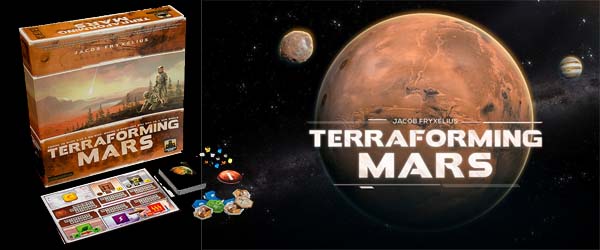
Steam recently released a digital version of the board game Terraforming Mars. I haven't played the digital version (which is getting "mixed" and negative reviews at the time of this writing), but I have played the board game version. It's pretty fun, and in celebration of the latest NASA probe landing on the surface of Mars, I thought I'd launch a review of the board game.
Terraforming Mars has a wide variety of gameplay mechanics, which makes it kind of difficult to clearly categorize it. It also makes it a little difficult to teach the game to new players efficiently. It's not an overly-complicated game, however. It's just a lot of different concepts that you have to explain. Regardless, I've been able to get through learning games with new players in about three or three-and-a-half hours (including the rules explanation). So it's not overly burdensome to learn and play. It's also not terribly hard to simply play a sample round to teach the game flow, and then mulligan the game if any players feel they dug themselves into a hole.
Terraforming Mars has multiple distinct mechanics, ranging from tableau-building to tile-placement.
There's tile placement with adjacency bonuses. There's resource management. There's action economy. There's a little bit of tableau building and hand management. There's even a certain degree of bluffing. Playing with the non-basic corporations adds variable player powers, You can even optionally play with card drafting! Pretty much the only thing that we're not doing is loyalty / betrayal mechanics. Despite including so many varying game mechanics, nothing feels out of place, and everything fits together well.
The rulebook includes footnotes explaining the scientific basis for the rules and mechanics.
Depending on how you play, however, the actual game board and your tableau of cards can sometimes feel very disparate. If you're not actively placing tiles on the board, then the whole board can pretty much boil down to a score and prerequisite tracker. However, if you're avoiding placing tiles on the board, then you're probably going to lose, as I've yet to see a predominantly card-based strategy win the game.
The board itself includes a map of Mars' surface, and has notable landmarks on Mars clearly labeled. Unfortunately, the board only covers one half of Mars' surface, so there's some notable landmarks that are not included at all (perhaps the other side of the planet is an expansion?). The resource cubes are very shiny and pretty, and have an appropriately sci-fi aesthetic to them. The rulebook also includes little footnotes that explain some of the scientific bases for the game's rules and mechanics. it's like the kind of thing you might expect if Neil DeGrasse Tyson wrote a board game. Science and space nerds will probably really appreciate these efforts at scientific accuracy.
The resource cubes are pretty, but shift around very easily on the flimsy, card stock economy boards.
Other components besides the resource cubes are kind of cheap and flimsy though. The player economy boards are printed out on basic card stock. There aren't any slots or grooves for the production cubes to sit in, so they slide around very easily if the table is jostled, or if the economy board is shifted around. You may want to invest in some third-party replacements or overlays in order to solve this problem.
The box also doesn't have any inserts of any kind for storing components -- just a handful of plastic, zip-lock bags. They expect you to just drop all the cards in a plastic baggie and just toss them in the box haphazardly along with all the other pieces!
At a price point of $70 (USD), I expect more from a game's components! Fortunately, where the game lacks in production value, it more than makes up for in entertainment value!
... [More]
ef527080-aedf-4583-a72d-8d6ee9108d4f|0|.0
Tags:Terraforming Mars, Stronghold Games, Jacob Fryxelius, board game, Mars, space, science fiction, terraforming, technology, hex, tile, city, forest, ocean, temperature, oxygen, victory points
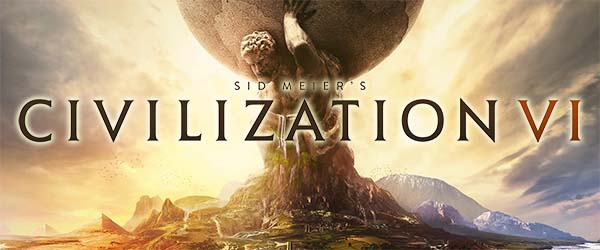
I really like Civilization VI! Of course, it has its share of nagging problems (some of which have been resolved already) - any game of this size and scope is likely to have issues at release. I've already been thinking of some ideas for how the game could be improved in expansions and DLC, and I'd like to spend a few posts to share some of those ideas with you now.
In my review of the game, I mentioned that oceans feel like they've regressed a bit since Beyond Earth: Rising Tide, in that they've returned to feeling like lifeless dead space on the map. Even though they're more important for Holy Sites and Campuses, mountains are also still mostly dead space on the map. They act as obstacles, and that's basically it. In expansions and DLC, I would like to see some of this space become more alive and useful. I'd like to spend this first suggestion post going over some ideas that I have for expanding the ocean mechanics, and for taking advantage of more of the map's dead space.
I have posted a link to this blog on Civfanatics at:
https://forums.civfanatics.com/threads/using-more-of-the-dead-space-in-the-map.610171/.
Feel free to discuss through the comments on this post, or via the linked forum topic!
Improve coastal cities
I'm very underwhelmed with coastal cities right now. Water tiles have very little utility. They provide small yield, can't have districts (other than a single harbor per city), and generally lack production. Coastal cities with lots of water are, thus, very unproductive and not really worth building. I think there's a couple ways to resolve this.
Harbors could provide a small amount of production. Or perhaps Harbors could act similarly to lighthouses from Civ V and provide production on sea resources. Or they could provide production on all adjacent sea tiles (so that placement is still important, and more of those empty sea tiles become useful and worth working, and you actually have to work them in order to get the benefit (as opposed to the Harbor just having an adjacency bonus). If we want to only use adjacency bonuses, then another alternative might be for Harbors to provide +1 production per adjacent coastal resource and +0.5 gold per adjacent water tile. That way, even cities that don't have clustered water resources can still have valuable locations for harbors.
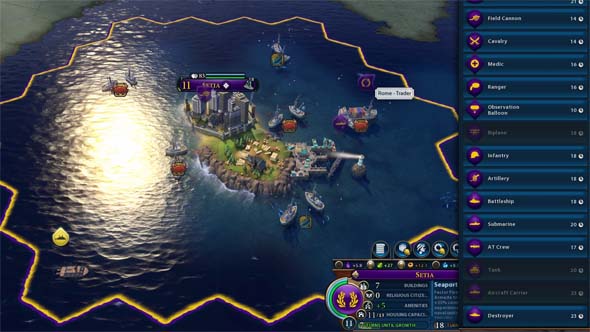
Coastal and island cities lack production and have limited space to build districts.
Another way to improve coastal cities would be to have some more early policies that benefit coastal cities. Perhaps the Maritime Industries policy could be changed to "+1 production in coastal cities, and +1 production from Harbors". Alternatively, Maritime Industries could be similar to the Veterancy policy, and it could provide "+33% production towards Harbor districts and buildings for that district". Or we could have policies that do both! A new policy could be added that provides the bonus production for early naval units. Maybe there can even be a whole extra early-game civic (maybe called "Seafaring" or "Way-finding") that has some policies and buffs towards coastal and island civilizations.
The lack of production for coastal cities could also be offset by giving them more gold and/or food for growth (in order to support a specialist economy)... [More]
0a6b7d05-286b-42c2-b6f9-dbbeca807f1a|1|5.0
Tags:Sid Meier's Civilization, Civilization VI, civilization, strategy, map, ocean, coast, beach, boardwalk, fishery, wind farm, island, mountain, observatory, astronomy, ski resort, tourism, tunnel, canal, navy, cities, Polynesia, way-finding, national park, naturalist, Civilization: Beyond Earth: Rising Tide

Now that I've gotten through the gauntlet of massive AAA releases like Metal Gear Solid V and Dark Souls III, I wanted to take some time to clear out some smaller games that have been collecting dust in my Steam library before diving into any other massive, time-sucking games. One of my highest priorities was the Indie sci-fi horror title Soma, developed by Frictional Games - the same company that made Amnesia: the Dark Descent. I had heard pretty good things about this game, and I liked Dark Descent, so I was eager to finally have a chance to dive into this one.
Learning from failures and forgetting successes
Soma show signs of learning from the weaknesses of both The Dark Descent and A Machine for Pigs (which was actually developed by a third party), even though it still doesn't necessarily nail the mechanics this time either. It's a far better experience than Machine for Pigs, and shows the level of quality that helped make Dark Descent such a hit. The most notable improvements from Machine for Pigs is in the depth of gameplay and monster encounters; and the most notable improvements from Dark Descent are in puzzle design and narrative.
Second chances
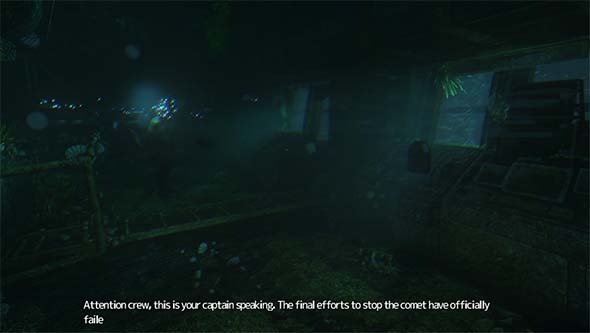
Monsters sometimes appear in where you get important story bits to incentivize you to not just walk away.
Monster encounters do still feel very un-threatening for the first half of the game. The first few monster encounters even seemed scripted to catch the player. This was possibly done in order to tutorialize the game's healing mechanic, but it also serves to desensitize the player to the monster and the threat of death right out of the gate. Unlike The Dark Descent, you don't start out terrified and cowering in fear from a mysterious and ominous enemy that can kill you in a heartbeat, and then gradually grow desensitized to it as it kills you and you realize that the consequences of death are pretty minor. Instead, you're taught right from the start that dying is virtually consequence-free, and that it isn't really worth the time and effort to try to avoid the monster by sneaking around, or to try to hide from it. The monster's appearance is never even surprising either. There's a screen-tearing effect and static noises to indicate that the monster is near, even if you can't see him. It's the same kind of effect that Slenderman played with. So even while you're walking around, you never feel the need to peek around corners or glance over your shoulder to make sure nothing's stalking you. This kills any potential for horror that the game might have been able to establish... [More]
fe37316f-173d-463b-a214-2d614c72dff2|1|5.0
Tags:Soma, Frictional Games, Steam, indie gaming, mind, consciousness, mind-body problem, transhumanism, robot, artificial intelligence, ocean, abyss, Amnesia: the Dark Descent, Amnesia: a Machine for Pigs, The Swapper, science fiction, Philip K. Dick, Turing Test, ludonarrative

I'm starting to feel like quite the prognosticator. Earlier this year, I started tossing around the idea of Nomadic civilizations for future Civ games. Around the same time, Creative Assembly announced Attila: Total War. They had apparently come up with almost the same idea independently at the same time. Well, now the teams at Firaxis have also implemented a variation of my idea for their new expansion to Beyond Earth, called Rising Tide.
This expansion seeks to remedy several of the core complaints with the Beyond Earth game. In my original review for Beyond Earth, my two biggest complaints were that the game and its leaders lacked the personality and variety of Civilization V, and that it just didn't feel futuristic enough. Both of these complaints ended up being the major focus of the first expansion, which definitely helps to make Beyond Earth stand out a little bit from its more realistic counterpart.
So we sailed up to the sun, till we found a sea of green
One of Beyond Earth's biggest failings was its lack of creativity in using its futuristic setting to innovate gameplay. The game felt very much like a reskin of Civ V rather than a new game. A big part of this was that the map posed many of the same sorts of restrictions on players that the Civ V map did: mountains, canyons, and oceans were all obstacles either impassable by units or uncolonizable by cities.
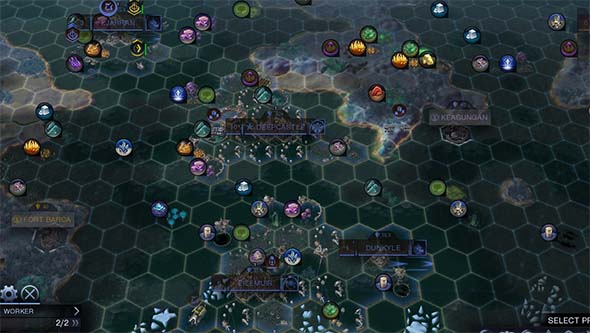
Aquatic cities and civilizations help to separate Beyond Earth's futuristic setting from Civilization's historical roots.
Well now one of those restrictions has been lifted, and civilizations can build floating cities in the oceans. Such cities can even be moved in order to claim new tiles or to act as mobile military bases. This opens up some interesting (and sometimes silly) new strategic possibilities, but the whole mechanic feels a bit contrived to me. Moveable cities is something that I think can work very well in Civilization, but I just don't feel that Firaxis gave us much reason to ever need to move cities in this game. My proposal for nomadic civilizations was two fold: such a faction could mobilize its entire civilization right up to an enemy's borders during war; and it could also move in response to changing map conditions (migrating animal resources or climate change) during peace. Beyond Earth hits that first point by turning cities into massive aircraft carriers, but there aren't any mechanics in place to make the map a factor.
Fish and other harvestable sea creatures don't migrate, and other resources don't move. So if you aren't using your aquatic cities as mobile military bases, then there's never any real need to move them. And if you're not playing as the North Sea Alliance faction, then the cost to move a city can feel prohibitively expensive. The people at Firaxis seemed to have recognized this, and so they made it so that aquatic cities don't grow their borders based on culture. Instead, you must either buy new tiles or move the city itself in order to acquire adjacent tiles. But since moving takes valuable production time away from the city, I rarely find myself moving a city, and instead I just buy any tiles that I want.
Aquatic cities can be moved, and can act as mobile military platforms and aircraft carriers.
There are other pros and cons to aquatic cities, such as health benefits, faster virtue acquisition, and more profitable trade routes. You can also move the cities around to temporarily acquire resources that allow you to build specific resource buildings, but at the cost of possibly temporarily hurting your city's growth or production (and maybe even starving the city if you move away from food-generating tiles). So there's a lot to think about when build an aquatic or nomadic civilization, but it all feels kind of like ad hoc mechanics in order to make the mechanic seem more meaningful than it actually is. That isn't to say that mobile cities is a bad feature in Beyond Earth. It's perfectly functional, and can be fun to play around with. It just feels a little gimmicky.
Just look at the world around you, right here on the ocean floor
It certainly helps that the oceans themselves are a much bigger part of the game. The ocean isn't just divided into coastal tiles and empty ocean anymore. There's a whole host of new aquatic resources, and even the sea floor itself has different features. This definitely provides some incentive and reward to building floating cities, since the ocean can be a rich source of resources. The ocean tiles themselves can even be improved with a variety of new improvements (including basic farms and mines).
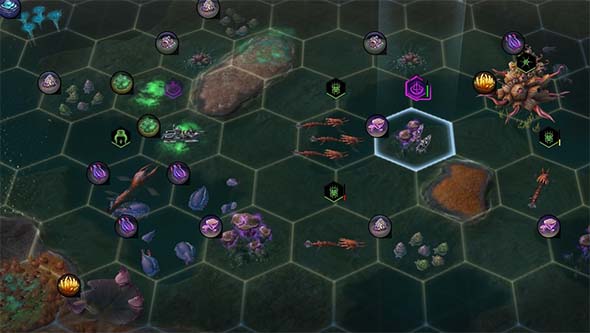
The oceans are alive with life and resources, giving reason to found aquatic cities.
Aliens are also active in the oceans. Sea creatures will build nests (just like their land counterparts), and there's a new alien creature called Hydrocoral that is stationary but which spreads across the ocean surface if left unchecked. Resource pods, artifacts, and quest triggers can all also be found in the ocean. So there's plenty to do in the water now, oceans feel more like a genuine part of the map rather than just dead space between continents, and the variety of features and resources in the ocean helps to make the world look more alien.
... [More]
da86c697-6def-4ade-b575-051869e1f38d|2|5.0
Tags:Sid Meier's Civilization, Civilization: Beyond Earth, Civilization: Beyond Earth: Rising Tide, Rising Tide, Firaxis, 2K Games, PC, Steam, strategy, grand strategy, turn-based strategy, science fiction, space, water, aquatic city, nomad, ocean, trench, submarine, diplomacy, affinity, alien, Civilization: Beyond Earth
|

| 12 | | | | | | | 60 | | 11 | | | | | | | 55 | | 10 | | | | | | | 50 | | 09 | | | | | | | 45 | | 08 | | | | | | | 40 | | 07 | | | | | | | 35 | | 06 | | | | | | | 30 | | 05 | | | | | | | 25 | | 04 | | | | | | | 20 | | 03 | | | | | | | 15 | | 02 | | | | | | | 10 | | 01 | | | | | | | 05 |
|